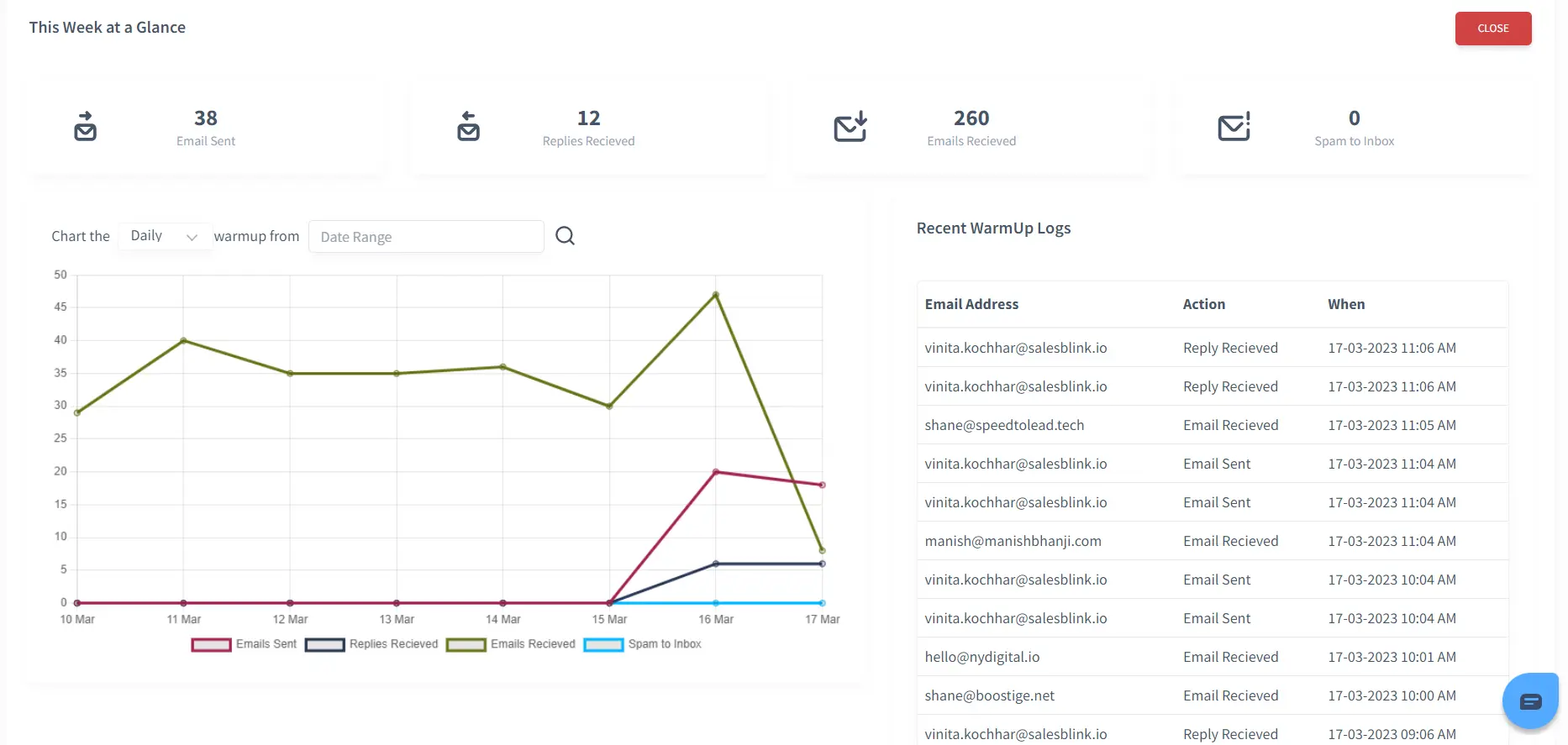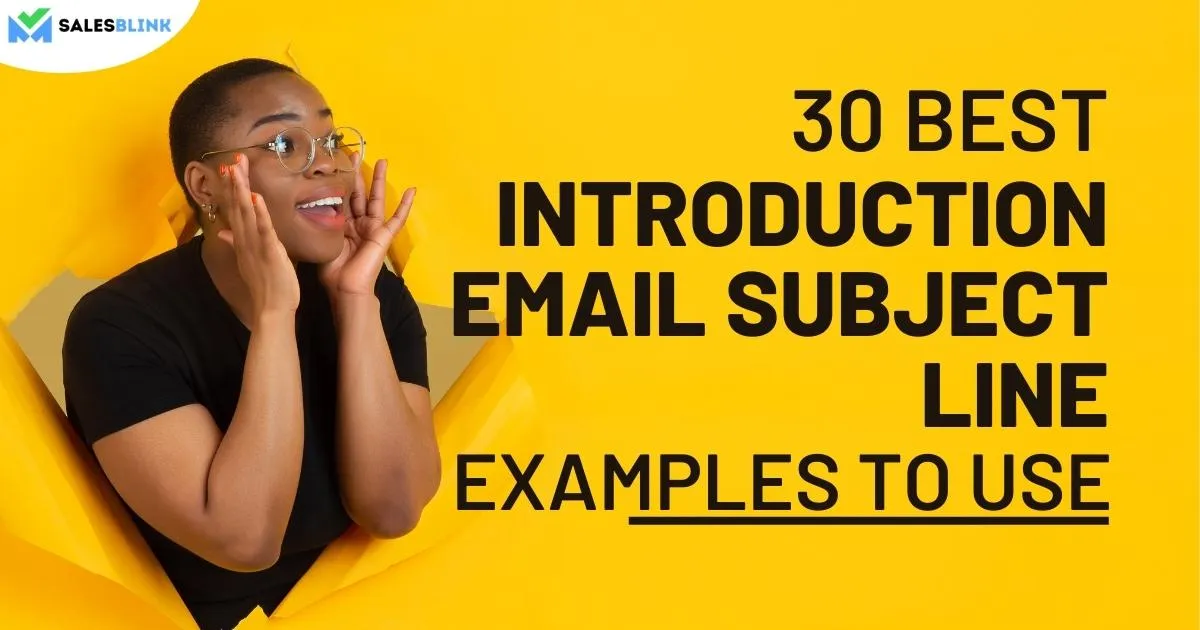30 Best Introduction Email Subject Line Examples To Use
With an ROI of $38 per $1 invested, cold emailing is an effective way of reaching out to prospects. But the recipient will not always read your email which is why you have to craft a striking subject line. You already know that it is the first thing that strikes the eye when a recipient sees their inbox especially when it is an introduction email. In a way, it decides the fate of your cold email campaign. That’s why you have to work on the introduction email subject line.
However, most sales reps are not capable of coming up with subject lines that are good enough. And the problem is that if you cannot capture the prospect’s attention using the subject line, no matter how perfect your email content is, it would all be of no use.
To help you out, we have examples of near-perfect introduction email subject lines lined up for you in this blog post.
Table Of Contents
- What Are Introduction Email Subject Lines?
- Why Cold Email Subject Lines Are Important?
- Tips For Writing Eye Catching Introduction Email Subject Lines
- 30 Examples Of Email Introduction Subject Lines
- How To Ensure Spam Filters Don’t Catch Your Emails?
- The Best Way To Introduce Yourself In A Cold Email
- FAQs
What Are Introduction Email Subject Lines?
Introduction Email Subject Lines refer to those subject lines that you craft for introduction emails. In such emails, you reach out to the prospect to build a rapport and a far-fetched goal of closing a deal.
But before we jump to what the best introduction email subject lines are, let’s know about the importance of a subject line in depth.
Why Cold Email Subject Lines Are Important?
As you have already seen, your email subject line decides your open rate. As per statistics, 47% of individuals determine whether they should open the email or not based on the subject line. And if the prospect doesn’t open your email, there is no chance of making a sale, right?
There is always a chance to convert the prospect into a paying customer with catchy email subject lines. However, this can be challenging as a person gets hundreds of emails a day, and the chances of the prospect opening your email are less unless it is a priority. That is why you have to put in extra effort to make your subject line stand out.
The chances are scarce if you use the routine generic cold email subject lines. That is probably why the average open rate is as low as 21%. That means 80% of the emails sent go unread by the prospect, which can be pretty disappointing for a salesperson who put in so much effort in crafting emails and taking care of each tiny detail like the CTA and sending time. Also, it can affect the ROI drastically. However, this is part and parcel of the life of a salesperson.
30 Examples Of Email Introduction Subject Lines
Now that you know what goes into writing a winning subject line for introduction emails, let’s see a few examples of cold email introduction email subject lines you should try using, and they include the following:
Subject line 1
Fellow {{mention_common_interest}} who would like to connect
In the subject line above, there is the use of the personalization tactic to get the recipient’s attention. It is clear and great for reaching out to someone you know a little. You can look at their social media account and find out their interests. If you find an interest you both have in common, it can be a great way to begin the conversation.
For instance, if the prospect has shared a lot of posts on dogs, it means that they are interested in dogs. “A fellow dog lover would like to connect” is a good subject line.
Subject line 2
Interested to learn more about your recent blog post on {{blog_name}}!
When you compliment someone for their work, you make them feel elated. That is why the best way to reach out to someone is by doing your homework beforehand. Find the articles and blog written by prospects and point out the one you enjoyed reading the most in the introductory email. The above subject line shows that you have made an effort to read the blog post before getting connected and would probably leave a good impression on the prospect.
Subject line 3
Seeking the advice of a {{industry_name}} expert
Some professionals love to share their knowledge, and seeking their advice is a great way to reach out to them. This subject line makes the prospect curious about what advice you need from them and arouses their interest.
This kind of approach works across industries. You will only gain from this connection and grow your business. Make sure that you genuinely ask for advice in the email body and don’t fake it because the prospect would find out that it was clickbait.
Subject line 4
Hello {{prospect’s_name}}, I have learned so much from your work
It is common to personalize the subject line by mentioning the prospect’s name in the subject line. Most sales automation tools let you personalize the subject line this way at scale so that you don’t have to put in effort for every email. Here you compliment the prospect by saying that you learned so much from them. Make sure that your email body also has relevant content in it so that you look genuine to the prospect.
Subject line 5
Referred by {{name_of_the_mutual_contact}} to discuss {{topic}}
Mentioning mutual contact is another way of getting the attention of the recipient. It is easier for the prospect to trust you when someone they know is involved. It helps make your email get more opens which is why this is the best subject line for introduction emails.
Subject line 6
{{Mutual_contact_name}} told me you are an expert in {{topic}}
Here you mention the name of the mutual contact and make the other person feel important by calling them knowledgeable. It is an excellent way of initiating a conversation and building a relationship with the prospect.
Subject line 7
{{First_name_of_prospect}}, let’s connect
Using the above introduction email subject line is a straightforward way of connecting with prospects, and at times it works well too. You have to focus on building a relationship with prospects and not start with your sales pitch. Get to know the prospect and understand their needs before presenting your product or service. It would help you tailor your pitch according to the prospect’s requirements.
Subject line 8
Hi, {{prospect’s_name}} this is {{your_name}}
Here’s yet another direct way of reaching out to the prospect. You can tell a bit about yourself and shift focus to the product or service and how it will benefit the prospect’s business. It is essential to always be customer-centric in your emails, or else the prospect will lose interest. They will listen to what you have to say only when they know there is something in it for them.
Subject line 9
Hi {{Name}}, I think this is going to be interesting for you
Here there is the mention of the prospect’s name in the subject line, which usually gets the recipient’s attention. Though this personalization tactic is too commonly used, it does work.
Subject line 10
Hi, {{name}}, can you help me with {{topic}}
In this introduction email subject line you are asking for help, which is a good reason to connect. It seems simple but is generally a great way to reach out to a prospect to build a long-term relationship.
Here’s a list of some more cold email subject lines that you can find helpful,
Subject line 11
My opinion of {{mention_topic}}, let me know what you feel
Subject line 12
What do you think about {{mention_topic}}?
That’s another way to get the prospect’s attention on a topic related to their industry.
Subject line 13
I have found some amazing details about {{mention_topic}}
You can choose to build a relationship with the prospect by sharing a piece of information with them and initiating a discussion.
Subject line 14
{{Prospect’s_Name}}, let us collaborate
This is a direct approach to reach out and build a rapport with the prospect.
Subject line 15
Hi, this is {{your_name}}. {{Name_of_mutual_contact}} introduced us at the seminar
In the above subject line, there is a mutual contact to reach out to the prospect. Also, the context is mentioned making it easier for the prospect to recollect.
Subject line 16
Read your thoughts on {{mention_topic}}. Amazing!
Here you compliment the prospect, which is an excellent start to the relationship.
Subject line 17
A note from a {{your_job_title}}
Subject line 18
Really like what {{prospect’s_company_name}} is doing – Can we chat?
Here you are praising what the prospect’s company is doing. It also indicates that you have done your research before initiating a conversation.
Subject line 19
Hi {{first_name}}, {{mention_the_pain_point_of_the_prospect}}
Here you arouse the interest of the prospect by mentioning their pain point, Read more about customer pain point. They would understand that you have done your research already and are willing to help them out.
Subject line 20
Are you thinking about {{goal}}?
Yet another way to make the prospect pay attention to you. They will feel that you are aware of their company’s goals and open your email.
Subject line 21
Need help in applying {{new_regulation}}?
In this introduction email subject line you are offering support to the prospect, and if they need your assistance, they will get a response to it.
Subject line 22
{{Name_of_mutual_contact}} asked me to reach out to you
Subject line 23
I came to know about you through {{Name_of_mutual_contact}}
Both are a few more examples of how you can use a mutual connection to reach out. It is quite direct here and likely to get a response.
Subject line 24
Hi {{name}}, {{ask_a_question}}
Asking a question in the introduction email subject line piques the prospect’s interest. It can work well in helping you build a relationship.
Subject line 25
A {{mention_benefit}} for {{name_of_the_prospect’s_company}}
When you mention the benefit of your solution right in the subject line, there is a higher chance of getting clicked. Plus, there is personalization by mentioning the name of the prospect’s company.
Subject line 26
An idea for {{topic_that_interests_prospect}}
You can find out what interests the prospect the most and use it as a conversation starter.
Subject line 27
We have {{mention_common_interest}} in common
This introduction email subject line can give you the chance to initiate the conversation well. When the prospect learns that you share a common interest, they tend to pay more attention.
Subject line 28
5x {{Prospect’s_company}} revenue in 2 months
Presenting your results in numbers can go a long way in grabbing the prospect’s attention.
Subject line 29
{{Your_company}} x {{prospect’s_company}}
Subject line 30
{{mention_number}} of ways our software can change your life
The ones above are good email subject lines for introduction emails that can fetch you more responses.
Tips For Writing Eye-Catching Introduction Email Subject Lines
To make your sales email subject lines for an introductory email stand out, you have to keep a few things in mind. Here are the best practices for writing an eye-catching subject for introduction email. Also, learn more about our email subject line generator.

1. Keep your subject line short and catchy
You must try to convey your message in the best possible way while using the minimum number of words. Does it sound challenging? Well, it won’t be if you keep practicing it. Ideally, according to any respected email marketing agency, the length should be around 3-4 words or 7-40 characters in length. It would help to maintain the optimal length because longer subject lines are more likely to get cut off in the preview. The length varies based on the device and the email service provider, but you must try your best to keep the subject line short. After all, your email would be of no use when your subject line gets cut off when it lands in the recipient’s inbox. The person might ignore it or toss it into the trash folder.
2. Personalize
Time and again, sales experts remind the importance of personalizing emails. Even your subject line should be personalized as the sales email subject lines with the recipient’s name get a 50% higher open rate.
When you choose to personalize your subject line, the recipient feels that the email is relevant to them and would want to open it. You can use the recipient’s first name to give a personal touch. If you don’t want to do so, you can mention something else like the blog they wrote for recently or a common interest you both have.
3. Keep it interesting
As it is the subject line that decides whether or not the email is worth opening, you have to pay additional to it. You have to make it interesting to read, and for that, you can add elements of what the prospect might care about, which can be a recent development in the industry, a statistic, a project they are working on, etc. You have to keep the subject line customer-centric so that they click to open the email, read it and respond positively.
4. Mention an offer
Are you offering a product or service that the prospect has been looking for? Do you have a fantastic idea for the recipient? If so, you should mention it in your subject line so that the prospect feels like opening the email. If you can make the prospect’s life easier with your offering, you should not step back from making it evident to them. They will work towards attracting the prospect to your email.
5. Create a sense of urgency
By creating a sense of urgency, you can make the prospect want to open and read your email. FOMO (fear of missing out) works most of the time. A time-limited deal makes a person not interested in purchasing want to close the deal right away. Though this tactic is effective, you must not depend on it all the time because overdoing it can turn your prospects off.
6. Be clear
In your introduction email subject line, you have to mention why you are reaching out to the recipient. When the purpose of the email is clear, it will be easier for them to relate to your message.
7. Say no to clickbait
While click-baiting may look like an easy way to get the recipient to open your email, you must refrain from doing so. Using subject lines that have no connection with the content of the email can tarnish your image forever. When the prospect comes to know that it was a clickbait, they will distance themselves from you and even mark you as spam.
If you don’t have the time to craft email subject lines by yourself, there is SalesBlink’s free email subject line generator to help you. It can come up with creative outputs to make it easier to think out of the box. After all, we all need that nudge to do our best, and SalesBlink’s generator does just that. You won’t even have to sign up to use it; it is an entirely free tool.
So now that you know what a good subject line is for an introduction email, let’s explore further.
How To Ensure Spam Filters Don’t Catch Your Emails?
The essential point is that you have to focus on when running an email campaign is your email deliverability. Your cold emails must hit the prospect’s inbox and not get caught by the spam filter. Here’s how you can ensure that:
1. Don’t add too many links to the email
Maintain the idea, link to text ratio. Too many links can make your email get filtered and sent to the spam folder.

2. Send from a sender domain with a good reputation
Avoid sending your emails from a domain with a poor sender reputation. Also, follow the best practices to prevent the domain from coming under the scanner.
To ensure your email deliverability is good, you must warm up your email sender before sending emails. And SalesBlink helps you do that. All you need to do is turn the email warmup on for your sender, and the tool will take care of the rest. So basically, there will be no need to manually warm up your email account, saving you a lot of time.
Here’s a screenshot of the warm up of an email account in action,

Do try SalesBlink’s 7-day free trial.
3. Format subject lines properly
If you don’t want to look like spam, avoid using all capital for your subject lines and keep the use of exclamation minimal. Say no to trigger words like ‘free’, ‘discount’, and ‘win’ in the email. Also, proof-check for typos.

The Best Way To Introduce Yourself In A Cold Email
In an introduction email, you don’t know the prospect, nor do they know you. That is why you have to put your best foot forward in introducing yourself to them. Here’s how you can do that,
1. Use a subject line that draws the prospect’s attention
This is what we already discussed. The email’s subject line decides whether the prospect will open the email or not.
2. Address your email to a person
If possible, try to address your email to a person to get along with them personally. It is much better than sending an email to sales@xyzcompany.com. The chances of getting ignored are less when you connect to an actual person.
3. Make use of mutual connections
In an introductory email, it is always better to get a mutual connection in between. Mention the person’s name right at the beginning of your email to get the prospect glued to your email and read on further. The fact is that a referral can make you look more trustworthy, and you should use it for your benefit.
4. Avoid dictating terms
Making a request is much better than telling the prospect what to do. Nobody likes to be ordered, and if you intend to present your product or service, you have to use a polite tone. Say something like- “Will you be interested in a quick call to discuss this further, if you have the time?” instead of “Please connect with me on a call”
5. Don’t make it too lengthy
What you must never forget is that the current generation is that of skimmers. People don’t want to sit down and read your whole message. They will skim through the email and catch the keywords that strike their eye. If they don’t find anything essential or catchy in the first paragraph, they tend to ignore the email altogether. That is why try to keep your email short and sweet with a maximum of 3 paragraphs. No one has the time or patience to read lengthy essays. StudyCrumb, on the other hand, is a top-rated essay writing service. Being to the point can be a life-saver for you and the prospect.
6. Format the email well
The design and format of your email matter, and for a cold email, you should keep it as simple as you can with a legible font so that the prospect doesn’t find it difficult to read.
7. Close professionally
Just as the starting of the email is important, so is the email’s closing. Choose to end the email with a clear CTA so that the prospect knows what they should do after reading your email. Add only one CTA to your email to avoid confusing the prospect.
8. Add an email signature
You can make it easier for the prospect to get in touch with you when you include an email signature. Make sure that you add your name, address, phone number, and social media links. Adding a link to your company’s website is also a good idea as it will lead to more traffic to your site, and the prospect will get to know a bit more about your product or service.
Excel At Crafting Your Introduction Email Subject Line Every Time!
As you are aware that introduction emails and their subject lines hold an exceptional place in your cold email campaign, you should follow the tips and use the examples mentioned above. They will help make your sales email subject lines stand out from the other emails in the prospect’s inbox. It may take some extra effort from your end, but it is worth it as your email open rates will be higher.
You can thank us once you start seeing results with our catchy subject lines for introduction emails.
FAQs
Introduction Email Subject Lines refer to those subject lines that you craft for introduction emails. In such emails, you reach out to the prospect to build a rapport and a far-fetched goal of closing a deal.
There is always a chance to convert the prospects with catchy email subject lines. However, this can be challenging as a person gets hundreds of emails a day. That is why you have to put in extra effort to stand out.
While click-baiting may look like an easy way to get the recipient to open your email, you must avoid doing so. Using subject lines that have no connection with the content of the email can tarnish your image forever.







